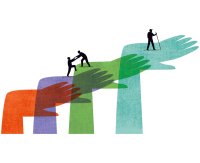The Benefits of an Alumni Mentorship Program for Students
A temporary strategy designed to improve virtual learning has become a successful schoolwide policy that supports students and teachers.
Your content has been saved!
Go to My Saved Content.This was a typical day in the fall of 2021 at my school: Brenda, both an alum of the school and an academic mentor, sits beside a student in Ms. K’s Advanced Algebra class, pencil in hand, assisting the student with the quadratic formula steps. Ruby, a mentor and 2018 graduate, interprets a lesson for a small group of newcomer students in Ms. Sanchez’s English 1 class. And Elsy, a 2019 graduate, coaches four students from Emiliano’s Spanish 1 class outside of his classroom. They practice conjugating the verb tener to prepare for tomorrow’s quiz.
Using Mentors to Support Students During the Pandemic
At the start of the pandemic, leaders at ARISE High School, a 400-student school in Oakland’s Fruitvale district, were tasked with radically reimagining how our students experienced virtual education. Our Academic Mentor Program was a short-term strategic approach to improve student engagement in Zoom classrooms in the spring of 2020.
During online learning, AcMentors, as we call them, worked with individuals and small groups in breakout rooms and communicated with students via chat to ensure that they were on top of their work. The program was successful in helping both teachers and students feel more supported within the constraints of online learning.
So when we made the decision, in the late spring of 2020, that we would attempt to return fully to in-person school in the fall semester, we prioritized the Academic Mentor Program. We used a substantial portion of our federal Covid funding to hire more than 20 alumni in order to ensure that we paired every teacher with an AcMentor supporting their classrooms.
From Imagination to Action
We began sending emails and making phone calls to recent graduates during the summer break in order to continue the AcMentor program for in-person schooling for the entire 2021–22 school year. We extended an open invitation to all alumni to apply, and we started interviewing and hiring candidates right away.
AcMentors needed to meet a few specific criteria. Each had to first enroll in college classes because a college education is a key component of our mission. We do not expect AcMentors to have all their goals figured out, but we expect them to be pursuing a postsecondary educational path.
Second, they had to demonstrate the ability to support students in at least one of the core academic areas of math, literacy, or science. Many confirmed this via their grades while attending ARISE. Others showed subject proficiency through their current college coursework.
Finally, there was their character. Because AcMentors will play a significant role in current students’ academic and social experiences, we needed to be clear about how they would respond to the numerous challenges that students face. AcMentors had to be recent graduates who exemplified our core values of Respect, Build, Persevere, and Lead during their ARISE experience.
We also wanted mentors’ pay to accurately reflect their value to the school. We compensate AcMentors at a rate of $25 per hour, which reflects the importance of their work in supporting our community. For the 2021–22 school year, we hired more than 20 AcMentors, enough to ensure that every ARISE teacher had at least one alum assigned to at least one of their classes, and some to every class, every day.
Making It Work
Some AcMentors devote their entire day to one teacher, assisting students in classes where they struggle the most, such as Advanced Algebra. Others travel with groups of students, such as Ruby, who spends the entire day with a small group of newcomer students.
The organizing principle is that AcMentors devote most of their time and expertise providing direct student support in the classroom. Even before the pandemic, many of our students were struggling in core academic areas such as literacy and math, and those struggles have been exacerbated by the pandemic’s challenges. Mentors play an important role in assisting students in regaining focus, transitioning back to the social setting of the classroom, and getting back on track with their educational goals. Every minute they spend with students is dedicated to maximizing learning beyond what a single teacher can offer in the classroom.
We began the 2021–22 school year with only a few hours of mentor training. These mainly comprised establishing expectations and responsibilities and building relational trust between the teachers and mentors. This semester, we continue to support mentors’ growth through monthly professional development in literacy, small group instruction, and supporting classroom engagement.
Impact
Students and faculty members have expressed gratitude for the program’s positive impact on their lives.
During a listening session, when school leaders opened the floor for feedback, one student shared, “I would not have survived this semester without the academic mentor in my English class.” Another student shared the impact of a mentor staying after school to support them, saying, “Brenda even stays after school to help me with my homework.”
Teachers see the mentoring program as beneficial to both their students and themselves. Ms. Ahmed, who teaches English 4 and Creative Writing, raved about how she can have Daisy, her AcMentor, facilitate literature circles with one group of students while she roams the room checking in on other small groups reading Malcolm X’s autobiography. “I work about 15 hours less per week because Melissa supports me,” Ms. Nixon, an art teacher, wrote in an email.
While the data is mainly anecdotal, the success of the program is undeniable: positive impact on the culture inside each classroom and across the school, an improved sense of sustainability for teachers, and increased academic support for all students, especially those with the greatest learning needs. What began as a temporary response to stifled learning during the pandemic has grown into a strategy we are working to make a permanent structure of our educational program.
